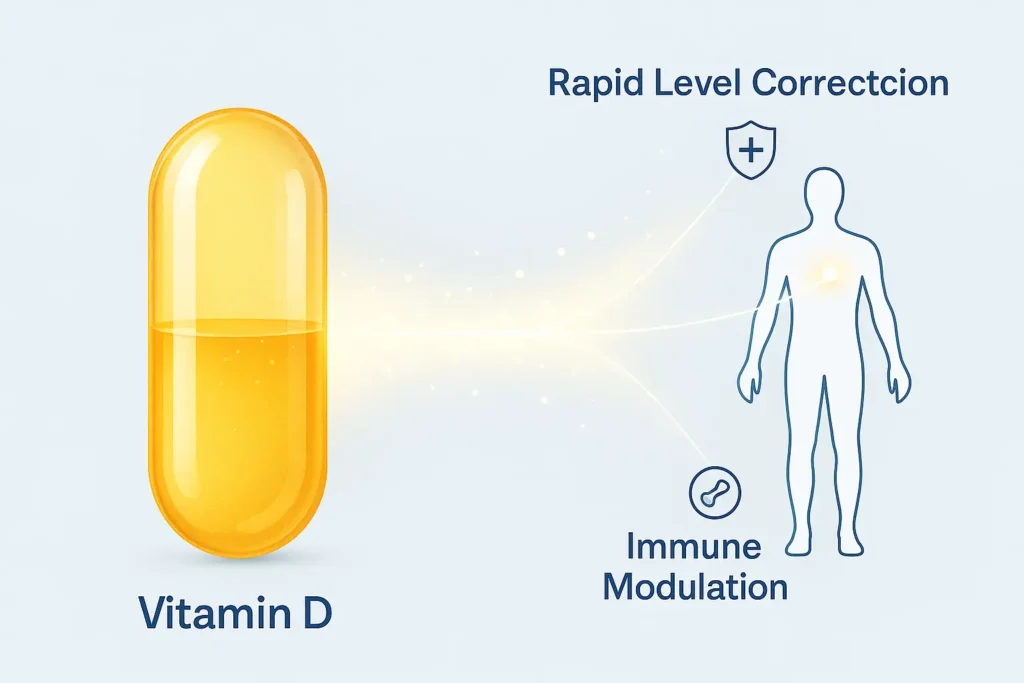Vitamin D, often dubbed the “sunshine vitamin,” is a crucial nutrient that plays a pivotal role in maintaining overall health. Unlike other vitamins, Vitamin D functions like a hormone, and every cell in your body has a receptor for it. It’s primarily known for its vital role in bone health, as it aids in the absorption of calcium and phosphorus – key minerals for bone strength. However, Vitamin D’s benefits extend far beyond just bone health.
Research has shown that Vitamin D is instrumental in supporting the immune system, regulating mood, and may even play a role in reducing the risk of chronic diseases such as heart disease and certain types of cancer. Its importance cannot be overstated, especially considering that Vitamin D deficiency is a global health issue affecting millions of people worldwide.
Introduction to Dr. Michael Holick’s Research
Dr. Michael Holick, a renowned expert in Vitamin D research, has significantly contributed to our understanding of this vital nutrient. His groundbreaking studies have shed light on the importance of adequate Vitamin D levels and the potential health risks associated with Vitamin D deficiency. Dr. Holick’s research extends into exploring the therapeutic benefits of Vitamin D megadoses – a topic that has sparked both interest and debate in the medical community.
One of the most notable aspects of Dr. Holick’s work is his emphasis on the need for more awareness about Vitamin D’s role in health and the dangers of deficiency. His studies have been instrumental in changing how we view Vitamin D supplementation and its impact on overall well-being.

Benefits of Vitamin D in the Body
Vitamin D is a powerhouse nutrient that plays a multifaceted role in maintaining our health. One of its primary functions is promoting the absorption of calcium and phosphorus, which are essential for building and maintaining strong bones. This is particularly important in preventing bone disorders such as rickets in children and osteoporosis in adults.
Beyond bone health, Vitamin D is a key player in the body’s immune system. It enhances the pathogen-fighting effects of monocytes and macrophages — white blood cells that are important components of immune defense — and decreases inflammation. Adequate levels of Vitamin D are associated with a reduced risk of diseases like multiple sclerosis, heart disease, and even a decreased chance of developing the flu.
Moreover, Vitamin D has a significant impact on mood regulation and mental health. Studies have linked Vitamin D deficiency to an increased risk of depression and mood swings. The vitamin’s role in regulating serotonin and dopamine levels, both of which are neurotransmitters associated with happiness and well-being, explains its influence on mood.
Vitamin D’s Impact on Bones, Immunity, and Mood
Vitamin D’s role in bone health is well-documented. It’s essential for the regulation of calcium metabolism, crucial for normal mineralization of bone, and a deficiency can lead to thin, brittle, or misshapen bones. For immunity, Vitamin D is more like a regulator than a booster. It helps in modulating the immune response, ensuring that it’s effective but not overly aggressive, thus playing a protective role against infections and immune-mediated disorders.
The mood-enhancing effects of Vitamin D are another fascinating area. Exposure to sunlight, which causes the body to produce Vitamin D, has been shown to increase serotonin levels, a neurotransmitter associated with feelings of well-being and happiness. This connection might explain why some people experience mood changes during winter months when there’s less sunlight.
Understanding Vitamin D Deficiency
Causes and Symptoms of Vitamin D Deficiency
Vitamin D deficiency is a common global health issue. One of the primary causes of Vitamin D deficiency is inadequate exposure to sunlight. Since the body produces Vitamin D in response to sun exposure, limited sunlight – due to geographical location, lifestyle factors like spending too much time indoors, or wearing clothing that covers most of the skin – can significantly reduce Vitamin D synthesis.
Dietary intake also plays a role, as not many foods naturally contain Vitamin D. Those who follow a strict vegan diet or have a milk allergy may be at higher risk of deficiency since they avoid some of the common dietary sources of Vitamin D, like dairy products, fish, and eggs.
Symptoms of Vitamin D deficiency can be subtle and vary widely but often include fatigue, bone pain, muscle weakness or cramps, mood changes like depression, and a general sense of not feeling well.

Long-term Effects of Low Vitamin D Levels
Persistently low levels of Vitamin D can lead to several long-term health issues. In children, severe deficiency can result in rickets, a condition characterized by soft, weak bones that can lead to skeletal deformities. In adults, prolonged deficiency can lead to osteomalacia, resulting in bone pain and muscle weakness.
There’s also growing evidence that Vitamin D deficiency may be linked to a higher risk of developing certain chronic diseases, including cardiovascular diseases, diabetes, and certain cancers. Additionally, it may negatively impact immune function, making the body more susceptible to infections.
Furthermore, the mental health implications of low Vitamin D levels cannot be overlooked. Chronic deficiency has been associated with an increased risk of depression and other mood disorders.

Dr. Michael Holick’s Perspective on Vitamin D Megadoses
Overview of Dr. Holick’s Studies on Megadoses
Dr. Michael Holick, a prominent figure in Vitamin D research, has conducted extensive studies on the impact of Vitamin D megadoses on health. A megadose refers to a significantly higher amount of Vitamin D than the daily recommended intake, often used to quickly elevate levels in individuals with severe deficiency or specific health conditions.
Dr. Holick’s research delves into the efficacy and safety of these high-dose interventions. He has explored how megadoses can rapidly improve Vitamin D levels, potentially offering quicker therapeutic benefits compared to regular supplementation. His studies have been pivotal in understanding how these high doses can be used safely and effectively, especially in cases of severe deficiency or certain health conditions where rapid improvement is needed.
One of the key findings from Dr. Holick’s research is that Vitamin D megadoses can significantly improve bone health, enhance calcium absorption, and contribute positively to immune function. He has also highlighted the potential of these megadoses in mood regulation and their role in reducing symptoms of depression, particularly in individuals with low Vitamin D levels.
However, Dr. Holick cautions against the indiscriminate use of Vitamin D megadoses. He emphasizes the importance of medical supervision and individualized assessments to determine the need for such high doses. Regular monitoring of Vitamin D levels is recommended to avoid the risks associated with excessive Vitamin D intake, such as hypercalcemia (high calcium levels in the blood), which can lead to vascular and tissue calcification.
Dr. Holick’s recommendations also stress on personalized approaches to Vitamin D supplementation, considering factors like age, geographic location, dietary habits, and existing medical conditions.
What is a Vitamin D Megadose?
Definition and Explanation of Vitamin D Megadoses
A Vitamin D megadose refers to a single large dose or a series of high doses of Vitamin D, significantly exceeding the daily recommended intake. While the standard daily recommendation for Vitamin D varies based on age, health, and exposure to sunlight, megadoses can be many times this amount. These megadoses are typically used in a clinical setting to rapidly correct severe Vitamin D deficiency, under careful medical supervision.
The concept of Vitamin D megadosing is grounded in the need to quickly elevate Vitamin D levels in individuals who have critically low levels. This can be due to various reasons, such as limited sun exposure, certain medical conditions, or absorption issues. Megadoses are often administered orally but can also be given intramuscularly in certain situations.
The Science Behind High Dosage Levels
The rationale for using Vitamin D megadoses lies in their ability to rapidly increase Vitamin D levels in the body. This quick elevation is crucial in scenarios where immediate correction is needed to prevent or treat health issues linked to severe Vitamin D deficiency, such as rickets in children or osteomalacia in adults.
Vitamin D is fat-soluble, meaning it is absorbed along with dietary fats and can be stored in the body’s fatty tissues. This allows for the administration of large doses that can be slowly released and utilized over time. However, the fat-soluble nature of Vitamin D also raises concerns about toxicity, particularly if the levels in the body become too high.
Therefore, while Vitamin D megadoses can be highly effective in rapidly increasing Vitamin D levels, they must be managed carefully. Medical professionals monitor these levels to ensure safety and effectiveness, adjusting the dosage as necessary based on regular blood tests.
Potential Risks of Excessive Vitamin D Intake
According to Dr. Michael Holick’s research, there is a significant risk associated with the prolonged intake of extremely high doses of Vitamin D. Specifically, consuming Vitamin D megadoses, such as 100,000 International Units (IU) daily for an extended period of six months, can lead to Vitamin D poisoning or toxicity.
This condition, medically termed hypervitaminosis D, results from excessively high levels of Vitamin D in the body, leading to a buildup of calcium in the blood (hypercalcemia). The symptoms of this condition can range from nausea and vomiting to more serious effects like kidney damage and other health complications. Dr. Holick’s findings highlight the importance of adhering to recommended dosages and underscore the potential dangers of self-prescribing high doses of Vitamin D without medical supervision.
Vitamin D Megadoses: Case Studies and Results
Real-life Examples from Dr. Holick’s Research
Dr. Michael Holick’s research on Vitamin D megadoses includes several real-life case studies that demonstrate both the efficacy and the safety considerations of such high-dose treatments. For example, one of his studies involved patients with severe Vitamin D deficiency who were administered megadoses ranging from 50,000 to 100,000 IU per week. These patients showed significant improvements in Vitamin D levels and related health parameters, like bone density and immune function.
Another notable case study involved individuals with chronic conditions like osteoporosis. Under Dr. Holick’s guidance, these patients received high-dose Vitamin D therapy, resulting in marked improvements in bone health and a reduction in fracture risk.
Analysis of Outcomes and Efficacy
The outcomes of these case studies reveal critical insights into the potential benefits of Vitamin D megadoses. Patients with severe deficiencies often experience rapid and significant health improvements, particularly in terms of bone health and immune system function. These results underscore the importance of maintaining adequate Vitamin D levels and the potential role of megadoses in correcting severe deficiencies.
However, the efficacy of Vitamin D megadoses is closely tied to careful monitoring and individualized treatment plans. Dr. Holick’s research emphasizes that while megadoses can be highly effective, they must be administered under medical supervision to avoid the risks associated with Vitamin D toxicity.
Overall, these case studies contribute to a deeper understanding of Vitamin D’s role in health and the careful approach needed when considering megadose therapy.

Debunking Myths About Vitamin D and Megadoses
The topic of Vitamin D and particularly the use of megadoses has been surrounded by various myths and misconceptions. It’s essential to address these with evidence-based clarifications to ensure a proper understanding of Vitamin D’s role in health.
Common Misconceptions
- Myth: More Vitamin D is Always Better
- Reality: While Vitamin D is crucial for health, there is a threshold to its benefits. Excessive intake, especially in the form of megadoses, can lead to toxicity. It’s important to balance Vitamin D levels to avoid negative health effects.
- Myth: Vitamin D Supplements are Unnecessary if You Get Sunlight
- Reality: Sun exposure is a primary source of Vitamin D, but factors like geography, skin pigmentation, age, and lifestyle can limit the amount of Vitamin D your body can produce. Supplements may be necessary for some individuals to maintain healthy levels.
- Myth: Vitamin D Megadoses are Safe for Everyone
- Reality: Megadoses are typically used to treat severe deficiencies and certain medical conditions under medical supervision. They are not suitable for everyone and can pose health risks if not properly monitored.
Evidence-Based Clarifications
Extensive research, including studies by Dr. Michael Holick, provides evidence-based insights into the use of Vitamin D and megadoses. It’s clear that while Vitamin D is essential for various aspects of health, including bone density and immune function, its supplementation needs to be tailored to individual needs. Megadoses can be effective in certain scenarios but require careful management to prevent toxicity.
The balance of Vitamin D is key, and understanding that neither deficiency nor excess is beneficial forms the basis of a sound approach to Vitamin D supplementation. Always consult healthcare professionals for personalized advice on Vitamin D intake.
The Future of Vitamin D Research
As we continue to unravel the complexities of Vitamin D and its myriad roles in the human body, the future of Vitamin D research looks promising, with emerging studies and trends pointing to new discoveries and applications.
Emerging Studies and Trends
Recent trends in Vitamin D research are focusing on its broader implications in human health beyond bone and immune system support. Studies are increasingly looking at Vitamin D’s potential role in mental health, its impact on chronic diseases like diabetes and cardiovascular disorders, and its influence on the aging process. There’s also a growing interest in how Vitamin D interacts with other vitamins and minerals in the body, offering a more holistic understanding of nutrient synergy.
Precision medicine is another exciting trend. As our understanding of genetics and individual health responses advances, future research may offer more personalized Vitamin D supplementation strategies based on individual genetic profiles.
Dr. Holick’s Ongoing Contributions
Dr. Michael Holick remains a pivotal figure in Vitamin D research. His ongoing work continues to contribute significantly to our understanding of this essential nutrient. Dr. Holick is involved in cutting-edge studies exploring the nuances of Vitamin D metabolism and its varied effects on different population groups.
His research also delves into optimizing Vitamin D intake for various health conditions and lifestyles, aiming to refine the recommendations for Vitamin D supplementation. Dr. Holick’s commitment to advancing this field promises to keep us informed about the evolving science of Vitamin D and its practical applications in health and disease management.
Conclusion and Key Takeaways
As we conclude our exploration into the world of Vitamin D, its significance in maintaining our health and well-being cannot be overstated. Vitamin D, often hailed as the ‘sunshine vitamin’, is essential for strong bones, a robust immune system, and overall mental and physical health.
Summarizing the Importance of Vitamin D
Vitamin D’s role extends beyond just bone health. It is a key player in immune function, mood regulation, and potentially, in the prevention of chronic diseases. Understanding the need for adequate Vitamin D levels, whether through sun exposure, diet, or supplementation, is crucial for all age groups.
The focus on Vitamin D also brings into light the issue of Vitamin D deficiency, a common yet often overlooked condition. Recognizing the symptoms and understanding the risks of deficiency are vital steps in advocating for better health practices.
Final Thoughts on Dr. Holick’s Research and Megadoses
Dr. Michael Holick’s research has been instrumental in deepening our understanding of Vitamin D, particularly in the context of megadoses. His work sheds light on the therapeutic potential of Vitamin D in high doses, underlining the importance of such treatment in certain medical conditions and severe deficiencies.
However, the key takeaway from Dr. Holick’s studies is the need for a balanced approach. While megadoses can be beneficial under specific circumstances, they should always be administered under medical supervision to avoid the risks of toxicity.
Dr. Holick’s ongoing research continues to guide our understanding and opens up new possibilities in the realm of health and nutrition. It serves as a reminder of the evolving nature of scientific knowledge and the importance of staying informed and proactive about our health choices.
Resources
- Vitamin D Council: This organization provides comprehensive information on Vitamin D, health, and research. It’s a valuable resource for anyone looking to deepen their understanding of Vitamin D and its effects.
- National Institutes of Health (NIH) – Office of Dietary Supplements: The NIH offers detailed information on Vitamin D, including its functions, recommended dietary allowances, sources, and effects on health.
- “The Vitamin D Solution” by Dr. Michael Holick: This book by Dr. Holick explores the importance of Vitamin D and provides insights into his research. It’s a great resource for understanding the science behind Vitamin D and its practical applications.
- PubMed Central: For scientific research articles on Vitamin D, PubMed Central is a reliable source. Here, you can find peer-reviewed articles, including studies by Dr. Holick and other experts in the field.
- The American Journal of Clinical Nutrition: This journal often publishes research on Vitamin D, including studies on megadoses, deficiency, and health outcomes.
- World Health Organization (WHO): The WHO provides guidelines and global perspectives on Vitamin D, including its role in disease prevention and health promotion.


0 thoughts on “Discover the Hidden Potential of Vitamin D: Dr. Holick’s Pioneering Research on Megadoses Explained”